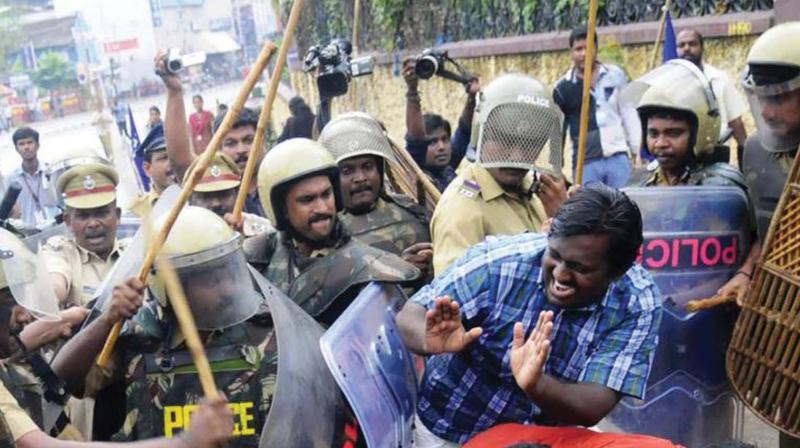Continuing impunity; Kerala chapter
Police violence has become something that goes on with continuing impunity in state over the years.

KOCHI: The Peoples Union for Democratic Rights (PUDR) came out with a 52-page report titled Continuing Impunity in March 2019 detailing custodial deaths in Delhi during 2016-2018. The report, although deals specifically with the incidents in Delhi, its findings have relevance for all over the country including Kerala rocked by a series of custodial deaths and incidents of torture in the recent past.
Although the present Kerala government is headed by a person who has suffered brutal custodial torture, the government told the state assembly the other day that it is not having the accurate data about the number of persons killed in custody after present government came to power in 2016. The government told the assembly that the data is being collected.
The data compiled by Shafeeq Thamarasserry, an online journalist based in Kozhikode, has listed the names of the 23 persons who have lost their lives in violence connected with police that included the killing of three Maoists in two separate incidents of ‘encounter’. The veracity of the so called ‘encounters’ has been questioned by civil and human rights activists.
Apart from the acrimonious political squabbles between the ruling and the opposition alliance the incidents of deaths and custodial torture has failed to generate a meaningful debate about the culture of policing and respect to civil and human rights in the state on the part of the law and order machinery. As the title of the PUDR report suggests the culture of police violence has become something that goes on with continuing impunity in the state over the years.
The cynical game of moral superiority played by adherents of LDF and UDF in the state over the dreadful acts of police torture and killings makes a sickening reading. As the number of persons killed in police-related violence in the state after the LDF came to power became a point of discussion, the CPM mouthpiece Deshabhimani came out with a report listing out the number of custodial killings during the five-year rule of the UDF.
According to the report 13 persons including a woman died in police related violence during the UDF regime. The daily also alleged that the government at that time has not registered a single case against the guilty cops.
Notwithstanding the claims and counter claims by political parties and their faithful supporters, persons keen on in upholding the values of civil and human rights needed to focus on the disturbing trends in the state over the years in connection with police violence.
Most police officials accused of custodial violence including deaths have not faced any meaningful disciplinary action that could act as a deterrent for the men and women in khaki.
Most of the tainted officials returned to the service after serving the mandatory suspension period. The systematic manipulation of the rules and regulations while taking a person into custody with the connivance of the higher-ups in the police establishment is the most discernable practice linked with the police violence.
The death of Rajkumar, the latest victim of police violence in the state, is chilling testimony of the complete failure of the chain of command supposed to ensure the protection of the individual in the custody.
In the case of Rajkumar, the magistrate allegedly remanded him to custody without following the mandatory requirement, forcing the High Court to seek a report on the matter. The doctor responsible for conducting the medical examination of the person under custody has failed to do justice to his profession by failing to record the precarious condition of the accused. The pattern is similar in most cases linked with police violence in the state. The PUDR report about the situation in Delhi also corroborates the trend.
The complete violation of the Supreme Court guidelines while taking a person into custody is something that has never been followed by the cops. This is especially true if the person taken into custody belongs to economically and socially deprived sections of the society. The victims of most cases of custodial violence invariably belo-ng to the economically and socially deprived sections of the society. This does not mean that persons belonging to socially and economically well-off sections will be spared of the abusive behaviour from the police.
The bitter experience of a postgraduate in engineering from IIT Chennai in Kochi shows that even persons belonging to the upper echelons of the society cannot hope to escape from the fury of the cops. The youth alleges that he was kept in illegal custody for three days before presenting him to the court.
The systematic destruction of evidence, failure to implement any of the recommendations by various judicial probe panels on custodial violence and the complete lack of will shown by the political executive are the primary reasons for the police to behave with impunity.
The PUDR report has highlighted the difficulty in gathering clear and solid evidences in cases connected with custodial violence due to the lack of independent witnesses in most cases. The perpetrators of rouge behaviour manages to go scot-free using the various loopholes in the judicial system and a pliable political executive is hand-in glove with the process leaving the hapless citizens to the mercy of a dreadful police Raj.

